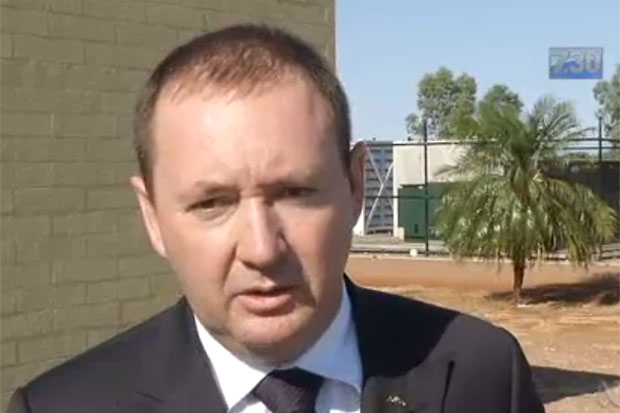The WA Corrective Services minister says he is “proud” of the Barnett government’s record on juvenile detention, despite plans to toughen mandatory sentencing laws, which experts say will only lead to more Aboriginal children in jail.
Western Australia currently jails the highest proportion of Aboriginal men, women and children in the country. Aboriginal youth are 53 times more likely to be jailed than their non-Indigenous counterparts.
The adult prison population has exploded since Premier Colin Barnett took office in 2008, going from 1,590 Aboriginal adults in jail to 2,214 in jail as of last week.
The Barnett government’s failure to address the Aboriginal incarceration crisis was recently highlighted by two reports from global advocacy group Amnesty International, one of which directly targeted Western Australia’s juvenile justice system.
But last week, the state’s Corrective Services minister Joe Francis told WA Parliament he was “proud” of his government’s record, saying that the numbers of juveniles in detention had reached a low.
“We are very proud of (our) record on juveniles. We have managed to have almost record laws of juveniles in detention for decades,” Mr Francis said.
“Today, the muster at Banksia Hill Juvenile Detention was 143 juveniles, which is a new low for who knows how long. That is compared with what it was under the Labor government and over the last two decades.
He said of that 143, 80 percent of them were Aboriginal youth.
But that figure was rejected by Amnesty International Indigenous campaigner Julian Cleary, who told New Matilda that if the numbers were falling, it was likely due to non-Aboriginal rates.
According to the latest Australian Institute of Health and Welfare statistics, released in March, numbers of Aboriginal juveniles in detention have continued to increase.

The average daily number of juveniles in detention during 2015 was 162, the vast majority of them Indigenous.
Mr Cleary told New Matilda since Colin Barnett took office, the percentage of Aboriginal youth in juvenile detention had increased from 72 percent to 78 percent.
“There’s a real problem when you are only pointing to one day. If you look at the trends over 12 months, it ebbs and flows a bit. It’s all well and good to say there are only 143 in detention today, but the stats show the average over the whole year is 162,” Mr Cleary said.
“The numbers have dropped a little bit, but it’s mostly dropped due to non-Aboriginal kids.”
Mr Cleary says Amnesty expects the numbers of Aboriginal kids in juvenile detention to rise following the state’s plans to toughen mandatory sentencing.
Western Australia is the only state in the country that has mandatory sentencing for juveniles, a policy that has provoked international condemnation. Controversially, there is a mandatory minimum sentence of 12 months detention or imprisonment for youth who have been convicted of a ‘three strike’ home burglary, meaning they have two prior convictions for home burglary.
A bill which is expected to pass the state’s upper house later this year will toughen these laws, lowering the counting rules for ‘repeat offender’ status for youth aged 16 to 17.
Amnesty says “under the changes multiple offences dealt with in court on one day will no longer be counted as a single ‘strike’.
“Under the proposed changes, a magistrate would have no option but to impose a one-year term of detention or conditional release order on a 16-year-old for their first court appearance if they have been charged with three counts of home burglary.”
There will be tougher requirements for 16 and 17-year-olds convicted of an ‘aggravated’ home burglary – that will carry a minimum three-year mandatory sentence.
Mr Cleary said the laws will tie the hands of the Magistrate even further, and result in more Aboriginal youth in detention. He says the small steps the WA government has taken to try and reduce rates will be undermined by its mandatory sentencing laws.
“To be fair to them, the WA government has just announced a program that’s being delivered by the Wirrapunda Foundation, working with some of the kids that have high rates of re-offending. That’s a positive step, it’s a small step in the right direction.
“For the first time ever they’ve given money to the Aboriginal Legal Service in WA for a youth diversion program and there’s the Yiriman project in the Kimberley that has received money.
“They are all positive small steps, but at the same time the government is expanding mandatory sentencing… Aboriginal organisations are still not receiving the majority of funding.
“They know by the fourth year of these mandatory sentencing laws, they will need 60 more places at Banksia Hill (detention centre).”
Donate To New Matilda
New Matilda is a small, independent media outlet. We survive through reader contributions, and never losing a lawsuit. If you got something from this article, giving something back helps us to continue speaking truth to power. Every little bit counts.



